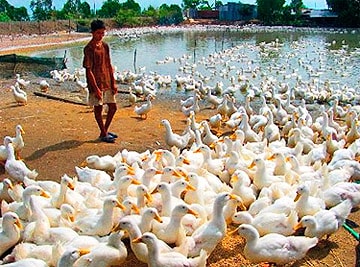Developing biosafety poultry
In An Giang, the National Agricultural Extension Center recently organized the Agricultural Extension Forum @ agriculture with the theme "Developing biosafety poultry farming (BS)".
Attending the event were leaders of the National Center for Animal Husbandry, representatives of the Department of Animal Husbandry, Regional Veterinary Agency 7, representatives of FAO in Vietnam, representatives of Institutes, Universities, leaders of An Giang province, the provincial agricultural sector and 300 farmers from 10 provinces and cities in the Mekong Delta region.
Duck farming is a traditional profession of the Mekong Delta. Ducks and their products are closely associated with the culture, customs and practices of the Southern people; bringing in a significant source of income, contributing to hunger eradication and poverty reduction.
According to the Department of Animal Husbandry, in 2012 the country's waterfowl flock was 84.71 million, contributing 27% of poultry products. In the Mekong Delta, the waterfowl flock accounted for the highest proportion in the country, about 40%, providing a large amount of meat and eggs for domestic consumption and export. In 2012, the Mekong Delta produced 852 million eggs, and in the first 6 months of 2013, it produced 384,096,679 eggs.
Although the poultry population in the region decreased in early 2013, the duck population was quite stable, proving that the profits from duck farming and the output of the products were very good. Currently, about 6/13 provinces and cities in the Mekong Delta have a total growing duck population. In the Mekong Delta, the average annual increase is about 12.4%, from 21 million in 2006 to over 67.5 million in 2012.

ATSH waterfowl farming is developing strongly in the Mekong Delta
According to Dr. Nguyen Van Bac, Deputy Head of the Southern Standing Department, National Center for Agricultural Sciences, in the Mekong Delta, poultry farming, especially duck farming, is a long-standing traditional occupation and an important source of income for most farming households, especially poor farmers.
Duck farming takes advantage of natural conditions (ponds, lakes, fields, canals, etc.), low investment costs; especially free-range farming, free-range ducks take advantage of large volumes of fallen rice. On the other hand, raising ducks in fields also takes advantage of natural food, destroying snails and harmful insects.
With the rice production calendar alternating between localities, free-range duck farming in the Mekong Delta takes place almost all year round, and increases during the rice harvest season. However, loosely controlled free-range duck farming is a risk of spreading and dispersing pathogens into the environment.
Since August 2008, avian influenza has been occurring sporadically in some localities. In particular, in recent years, the H5N1 virus in our country has been detected in a high proportion of waterfowl. Ducks have the ability to harbor a large amount of highly pathogenic H5N1 virus without showing any signs of disease.
Therefore, developing ATSH duck farming is a necessary need in the current conditions. Continuously from 2007 to now, in the Mekong Delta, the National Center for Animal Husbandry together with the Centers for Animal Husbandry of provinces and cities, the Institute of Animal Husbandry has organized and implemented many ATSH duck farming models in 10 provinces of the Mekong Delta.
At the forum, farmers asked many questions about ATSH poultry farming development models, disease prevention methods, super meat and super egg breeds, and product consumption.
Because currently the output of agricultural products is a prominent issue, including poultry; output prices are decreasing but the feed "is always higher year after year" causing many difficulties for farmers, after selling they do not want to restock...
Mr. Mai Thanh Phung, National Center for Aquaculture, commented: To ensure safe and sustainable development of poultry farming, the most important issue is the awareness of farmers. Therefore, it is necessary to strengthen training, technical guidance, practice ATSH farming measures, fully vaccinate, and link farming with consumption through businesses.
Strictly manage free-range ducks in accordance with the spirit of Decision 1405/QD-TT of the Prime Minister and Circulars 60 and 92 of the Ministry of Agriculture and Rural Development, regulating the conditions for poultry incubation and waterfowl farming in the Mekong Delta region.
According to Mr. Phung, An Giang is one of the provinces in the Mekong Delta with a very large poultry production, with many ATSH duck farming models that bring high efficiency; limit environmental pollution, do not spread avian influenza pathogens that affect human life. In the past 9 years, An Giang has not had an avian influenza epidemic, this is a valuable experience for provinces in the Mekong Delta to follow.
According to NNVN - LC






